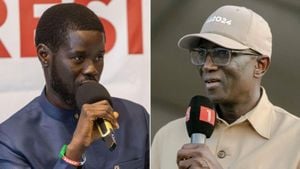The situation between Israel and Hezbollah continues to escalate, with dramatic developments marking the most intense phase of warfare since early October. Amid increasing military action, Israeli ground forces have ventured deep within Lebanese territory, reaching their most distant point since the onset of this conflict.
Reports emerged early Saturday indicating Israeli troops had made notable gains, including capturing strategic positions within the village of Chamaa, just 5 kilometers from the Israeli border. This move, confirmed by Lebanese state media, was characterized by fierce clashes with Hezbollah fighters. Notably, as Israeli forces withdrew, they were accused of demolishing key religious and residential sites, including reported detonation of the Shrine of Shimon the Prophet.
Simultaneously, Israeli warplanes have been active, targeting multiple locations within Beirut and southern Lebanon. Strikes concentrated on areas known to be Hezbollah strongholds, particularly around the Dahieh neighborhood of Beirut, which the Israeli military identified as housing militant infrastructure. Israeli officials, meanwhile, claimed the attacks were part of localized operational activities aimed at dismantling Hezbollah's capabilities.
The backdrop of this military escalation is underlined by heavy tolls: according to Lebanon’s Health Ministry, over 3,400 lives have been lost since late September, with the overwhelming majority of fatalities occurring within the last eight weeks. The humanitarian situation continues to deteriorate, exacerbated by airstrikes and ground operations.
On the diplomatic front, efforts to establish a ceasefire remain precarious. Lebanese officials are reviewing proposals from the United States intended to de-escalate military tensions. This proposal reportedly draws on UN Security Council resolution 1701, which had previously aimed to regulate peace between Israel and Hezbollah after their last significant conflict.
Lebanon's caretaker Prime Minister, alongside domestic political allies, has urged Iran to leverage its influence over Hezbollah, advocating for acceptance of the ceasefire terms which would involve the withdrawal of Hezbollah forces from the contentious border territories. This request follows indications of Iran’s willingness to facilitate discussions, though skepticism about the prospect of reaching agreed terms persists.
Meanwhile, the broader regional consequences of renewed hostilities cannot be overlooked. Just as the situation escalated, Israel has intensified air assaults against Gaza, prompting international outcry and calls for accountability over alleged war crimes. Reports estimate approximately 43,799 Palestinians have died since the outbreak of violence, creating mounting pressure for the United Nations Security Council to mediate solutions to both crises.
Adding to the complexity, the Lebanese internal political discourse has grown contentious. Speaker of Parliament, Nabih Berri, involved in negotiations with Hezbollah, has expressed resistance to clauses allowing Israel to maintain operational rights within Lebanon under the proposed ceasefire terms. He categorically stated, "We will not accept any infringement of our sovereignty," highlighting the sensitive nature of territorial agreements.
Hezbollah's response to the recent ceasefire proposal remains under scrutiny, with officials reportedly examining it and expected to convey their stance via Berri. The overarching mood, as indicated by various sources, leans toward pessimism about the acceptance of terms laid out by the US, particularly those seen as infringing Lebanese sovereignty.
Recent military actions intensified as Israeli officials signaled their intent to continue operations until Hezbollah complies with the proposed ceasefire. This aggressive posture follows the upsurge of rocket attacks from Lebanon, which have targeted Israeli positions, resulting in civilian casualties and damage within Israel itself. Reports of at least five injuries among Israeli civilians were confirmed following rocket strikes aimed at Haifa and neighboring regions.
Also of concern, the Israeli military acknowledged intercepting multiple rocket launches aimed at various targets. Hezbollah claimed responsibility for targeting Israeli military installations, illustrating the continued cross-border tension.
While hopes for diplomatic resolution exist, they are tempered by the realities on the ground, as each explosion reverberates through the political and humanitarian fabric of both Israel and Lebanon. The complexity of this conflict reveals itself not only through military maneuvers and diplomatic engagements but also through the narratives of ordinary people caught between the onslaught of violence and the desperation for peace.
The scene on the ground is stark; reports have come out detailing devastation across various neighborhoods struck by airstrikes, with residents sharing stories of uncertainty and loss. The damage, both physical and psychological, raises questions of what recovery may look like for communities torn apart by violence.
This battle is drawing serious global attention, with numerous countries urging de-escalation and reflecting on the humanitarian crises triggered by the conflict. Observers are closely watching to see how negotiations will evolve and if the US-brokered ceasefire has any chance of success amid such vehement opposition from key players involved.
The need for urgent humanitarian assistance is becoming increasingly apparent, with millions displaced within both Israel and Lebanon. Amid this crisis, the focus shifts to who will bear the burden of reconstruction once hostilities cease. The economic repercussions on Lebanon, already struggling with deep financial instability, raise concerns about the future as they potentially navigate yet another rebuilding phase from conflict.
Overall, as the Israel-Hezbollah conflict continues to take lives and escalate tensions within the region, the call for peace remains ever pressing yet fraught with challenges. The stakes for both governments, civilians, and international observers remain undeniably high as they wait to see which road will lead them out of this turmoil.



